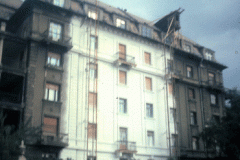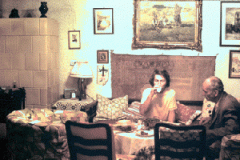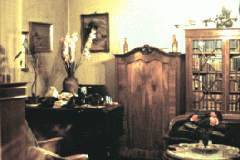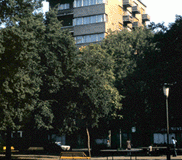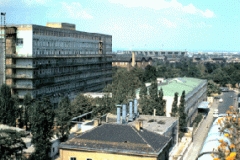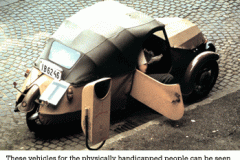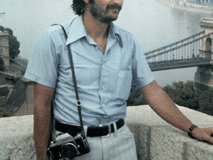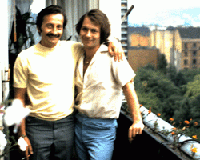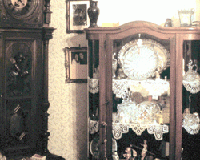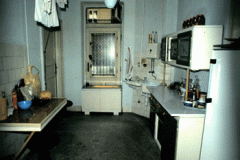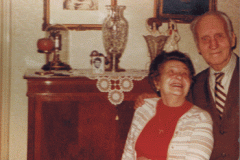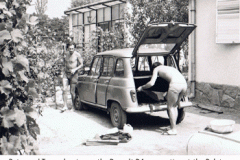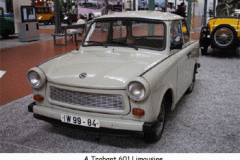I had an opportunity to return to Hungary for a month. We saved long and hard for the chartered flight. It was an interesting experience, as chartered flights really have no hard and fast schedules to follow. Consequently we were hours late taking off. We finally took off from the cargo part of the Philadelphia Airport.When I arrived in Budapest my parents and brother were waiting for me. The airport was old, smelled of stale cigarette smoke and was not air-conditioned. As I was to find out during this trip, nothing was air-conditioned! I was not happy. Going through Passport Control was much more intimidating than it needed to be. Most of the soldiers were teenagers and looked as though they needed their toes to count to twenty, yet they all carried automatic submachine guns slung around their neck.
Finally, my parents’ faces became visible as I emerged from the bowels of the airport into the main waiting room. Hundreds of people were waiting for their loved ones. After much crying and hugging we set off to the apartment. The house seemed familiar, yet different. A few years back my parents traded apartments with someone and now lived on the first floor. This was a much smaller one and they really didn’t need anything bigger. As per custom, at least of my generation, in Europe, there are no “bedrooms”, rather rooms with couches that are used as beds. So, there are two large rooms with twelve-foot ceilings, a small room off the kitchen originally reserved for the maid, a bathroom with a large claw-footed tub, a large kitchen with no hot water, a separate pantry and a water closet or WC with a toilet.
The courtyard, where my brother and I played for so many years was still there, albeit with enough changes to make it foreign looking. A lot of space had been filled up by garages, each different from the other. The big brick-backed building by which we played soccer as kids still stood, looking even older. In the middle at the bottom was the tiny glassless opening that was the pantry of one of the occupants in that building. It was our goal when we played soccer. Over the years some of the kids did terrible things to that person.
Click on image to see description.
My mother’s older brother, Jóska, was in the hospital, gravely ill. His wife, Magdus, had died a few years before and now it was his turn. They were always part of the bridge parties held at my grandparents’ apartment for many years. We visited him once before he passed. He still had his sense of humor and commented on my film containers affixed to the strap of my camera, saying they looked like ammunition for a weapon. It was good to see him after all these years, but I was saddened by his physical condition. A few days later we attended his funeral. He left my parents his kitchen stove. The one my parents had was much older and its oven was very temperamental; hardly usable. We went to his apartment to look at it. I was not prepared for this sight. About the only thing left in the apartment was the gas stove and hundreds of pictures strewn all over the floor. It made me think that all his relatives had taken everything of value, and nobody considered these pictures to be worthy enough to be passed on. It taught me some lessons: Pictures of scenery only hold relevance to those who were there, so if pictures of people are important to you, then you should label them with the names of the those in the picture and, at least, the year it was taken. Thankfully, digital photography has already addressed this issue.
The picture on the page was taken from my uncle George’s apartment on the 8th floor. The vehicle is for a physically handicapped person. It is basically a three-wheeled motorcycle. The body and the top are made of canvas. The large letter “T” is for “tanuló”, or student driver. If I may digress a little: Under communism very few people had cars. Afterwards more and more people became financially affluent, so most of the cars in town wore the letter “T”. Unfortunately most of the new drivers were already past their prime and became terrible drivers.
Other surprises awaited me inside the apartment: Almost everything was still there (my mother threw nothing out) and looked familiar but so much smaller, physically, than I remembered.
Some of the neighbors were still living in the apartment house and it was great fun visiting with them after all this time. I was actually looking forward to conversing as an adult, rather than a teenager. Each visit started out with the offering of some very strong alcoholic “aperitif”, a taste for which I never developed. Saying ‘no’ was not permitted, as the host was almost insulted if you didn’t drink with him. It is a really stupid custom in my opinion, although it is extended totally from the heart, with absolutely no malice at all. At first I just asked for “just a taste” and then left the excess. Then I discovered that if I said that I was driving, that was the end of it, so this is the excuse I tried to use whenever possible. There are some very strict and severe drinking and driving laws in Hungary and Europe in general.
The typical visit continued with a multitude of questions about my life in America. They usually ran the gamut from how much I made a month to are all the rooms in the house heated. The latter always made me think about how wasteful we, Americans, are. One elderly relative flat-out told me that he would never come to America because he was afraid of getting shot. The conversation was just getting interesting when someone looked at their watch and said in a panic-stricken voice: “Oh, my God, it’s almost 8 o’clock!” He quickly ran to the television to turn it on, while someone else turned off most of the light. The others shuffled around; arranging their chairs for the best viewing position and in complete silence began to watch the latest episode of “Dallas”. Yes, the American TV series, popular in America about ten years before that. Everybody in the room was knowledgeable about the characters, the plot, and the actors and at the end of the show, asked me questions. I couldn’t answer any of them because I never watched the show at home. The extent to which these intelligent people were involved in a TV show was a big disappointment to me. Yet, to see most of these friends and relatives was a pure joy. They made such a fuss over me, it made me feel as though it hadn’t been long years but only a few short weeks that we saw each other last. Europeans have a special knack for this, I believe.
Everybody made fun of the commercials American television ran during the shows. They didn’t have these interruptions. This created an interesting phenomenon. The apartment was in a massive building, whose entrance was in the middle. The building was laid out in a “U” shape and was divided into an “A” building and a “B” building connected together. The two five-story buildings were identical. Walking through the entrance led you to a courtyard, where my brother and I used to share that bicycle. To go to the apartment, you’d walk up about 15 steps and arrive at the stairway and the elevator. Walking through a set of swinging door you’d arrive at an open court, around which were the entrances of the apartments. This open courtyard gave one a feeling of airiness. Once inside an apartment there were two more ways of bringing in fresh air: Both the water closet and the pantry had windows that opened to what’s called in German as “lichthof” of light court. Basically, these were open shafts going to the top of the building and shared by water closets of two adjoining apartments. It was always interesting going to the bathroom, sharing the smells and noises of neighbors. It was no big deal; you could always close the window.
To get back to my story: Since back then there was only one TV station in Budapest, everybody watched the same show. When that show ended, everybody went to the bathroom at the same time. The sewage pipe was shared by the apartments above and below you, so as they flushed you could hear the water coming down.
It wasn’t too long into the future that multiple TV stations cropped up in Budapest and not too long after that, commercials were seen on Hungarian television.
My mother rented a car from a friend’s son. It was a Renault R4, a model that was never imported into the US. For good reasons, as you’ll see! It had a four-cylinder 1100 cc engine producing a whopping 28 HP. It was a front-wheel-drive car whose transmission was AHEAD of the engine, so there was a metal rod that came out of the transmission, headed toward the firewall on top of the engine, after a ninety-degree bend. Coming into the passenger compartment through the dash to the right of the steering wheel it ended in a knob pointing toward the sky. To shift gears, you would pull and push this knob and twist to the left or to the right. The fresh-air vents were surely that, as you could see the ground when opened. The windshield wipers worked only for as long as the switch was activated, meaning they had no automatic return to the bottom of the windshield, and they made as much noise as the engine.
I felt extremely intimated by this car and was fearful of my life being in danger at all times. The acceleration was pitiful. I didn’t start to feel better until I realized that I was among the one percentile of cars that had this much power. Ninety-nine percent of the cars in Hungary at that time were the fiberglass-bodied Trabants, made in East Germany. They had a three-cylinder, two-stroke engine, sounding very much like a coffee-grinder and polluting the environment. At one they held the cars responsible for killing the trees in Budapest. The drivers of these cars were infinitely worse off than I, so I felt much better.
Driving in Budapest was bad enough because I wasn’t familiar with the streets. Remember that I only traveled these streets using public transportation often allowed in areas public traffic is not. Driving on the highways was even worse. You found sharing the roads with not just other cars but bicycles, mopeds, horse-drawn wagons, pedestrians, all kinds of motorized and non-motorized farm equipment. Quite often a long line of cars was being held up by one of these slow-moving objects. Inevitably, someone would get impatient and pull out to pass, counting on someone to let them in if there was someone coming from the opposite direction. The amazing thing was that someone always would! Imagine yourself driving a Mercedes or BMW almost any car made in Western Europe in this traffic. You would get impatient, too.
Driving down to the Balaton was even more unusual to my American eyes. This took place at a time when most of the expressway to this busy vacationing spot in Hungary was complete but not all. Driving out of the city involved two-lane roads, until you reached the new section which was sort of like what I was used to in America. It was a concrete-surfaced road made up of two very wide lanes. As in any other country in the world, most of the traffic at the beginning of the weekend was heading TO the Balaton and those same people were heading AWAY from the Balaton at the end of the weekend. So, picture a long line of cars consisting of mostly Trabants, with a few Fiats and Zsigulis thrown in. Zsigulis were cars made in the CCCP (Soviet Union) licensed from Fiat of a model that was badly outdated. It was kind of like what the Soviets did with the 1930-something model of a BMW motorcycle they stole from the Germans before WWII: they manufactured this motorcycle with a sidecar for decades and called it a Ural, naming it after a Russian mountain.
So, you’re in one of the higher-than-Trabant-powered cars and approach the above-mentioned line of cars. There is no one coming from the opposite direction, so you pull out to pass as many as you can. You’re feeling exhilarated as you notice a car coming toward you. Now, here comes the neat part! As the people you’re passing and the ones you’re about to pass also see the same car, they move over to the right of the lane as far as possible. The car coming toward you does the same in his lane, leaving a third lane in the middle just for you! Pretty neat! Oh, I forgot to tell you something about passing: In Europe before you do, you flash your high beams to let them know of your intentions. Can you imagine doing that in this country?
I think I had the R4 for a couple of weeks during which time we got to visit the countryside. I got pretty comfortable with the car, so much so that on a stretch of straight road we were traveling at 140 KPH or about 87 MPH!
Some more car-related oddities: It seems that drivers wanted to spare the seats in their cars from becoming worn or even dirty, so every car in the country had homemade seat covers. When I took the covers off the seats in the R4, the seats underneath were brand new. Drivers have to attend a formal driver’s school in which they teach you not just the obvious but also the operation of the engine, drivetrain, etc. You even need to know how to change a flat tire, something I taught Mary, as well as all my children.
Why Was There No Unemployment Under Communism?
Because it takes FOUR people to perform the same function one American performs. This is obviously not a general statement, rather refers only to the retail business. A business, by the way, that is very much observed by the visitors to the country.
You visit a store. You go inside to see an item that caught your fancy in the shop’s window. The store is crowded, so you wait in line to see that item. When it’s your turn you tell the store personnel your wish, examine the item carefully and decide to buy it. You tell the person behind the counter, who then takes the item and hands it to the next person. You get into the line in front of that person and wait your turn. You get to the head of the line and point to the item you selected earlier. This store clerk will then write the item number, description, quantity, quality, date, etc. making God knows how many copies using the old-fashioned carbon paper. Your copy will then be handed to you, armed with which you will head for yet another station and its associated line, the CASSA, or the cashier. After paying the amount the copy of your receipt will be rubber-stamped countless times. The end is in sight. Only a few people are ahead of you now and once they have left it is your turn to finally pick up your purchase and actually hold it in your hands.
N. B. Due to the inherent nature of every Hungarian, they will ALWAYS try to get ahead of you regardless of what line you are in, you will get aggravated many times during this purchase.
The Hungarian Version of the Dollar Store
There are areas of the city which are frequented by the foreigners. It was in one of these that a store existed wherein the contents could only be purchased for foreign currency. Keep in mind that for most of the duration of Communism in Hungary it was illegal to possess foreign currency. I’ll wait until this sinks in.
Imagine the implications this could possess. The government says very loudly to the citizens, so that even those outside of the country can hear: “What do you mean you don’t have freedom? You can leave the country legally whenever you want.” Okay, where should I go? I would love to see the world but the government also says, very quietly this time, that if you do you can only take the equivalent of TEN DOLLARS with you! Thanks, but how long is that going to last on my vacation? Did you say you’re going to stay with relatives? Then you only get FIVE dollars!
This was the case with my parents whenever they visited us. They couldn’t even buy coffee for themselves twice if they had a layover somewhere. This was also the reason a few friends and acquaintances approached me on my visits to Hungary to ask me to send money to addresses abroad in exchange for Hungarian money. I never turned anybody down because I could picture and feel their predicament. It is also how I wound up with a twenty-dollar bill from Australia, which I added to my foreign money collection. I collect foreign money and match books. The latter has become kind of stagnant since smoking became so unpopular.
Well, back to the Dollar Store. Since only foreigners could purchase anything in this store, the government had to fill it with things a foreigner might want. Consequently some of these items could only be purchased in this store. Again, try to imagine how a Hungarian might feel about this. No sense in going in, since he couldn’t buy anything anyway, yet curiosity drew people to the window shop, like moths to a flame. So, there they stood, noses pressed against the window, looking at wares they could never purchase. I felt bad every time I walked by or into that store. I did go in, showing my American passport and quite often purchased things, some even for Hungarian citizens. The items contained in that store at that time were anything electronic, since these were not available in regular stores and larger pieces of either lead crystal or porcelain made by Zsolnay or Herend.
Over the years the government did relax the rules for owning foreign currency and permitted citizens to possess and spend up to twenty dollars at a time.
How Old Is Your Little Son?
I have had discoid lupus since my brother’s death in 1975. It is a progressive disease whose cause is unknown, hence there are no effective treatments. So far it has only affected only my head, mostly my face. When my mother saw my face on this trip, she wanted to help and offered to contact a dermatologist by phone. She introduced herself politely and proceeded to tell the doctor about the way “her little son” looked and about how much she wanted to help “her little son”. The doctor asked her some questions about the lupus and the final one was “Just how old is your little son, to which she had to reply “Thirty-two.” and then we all had a good laugh over that. It just proves that no matter how old the child is he or she will always be “little”. And that is the way it should be!
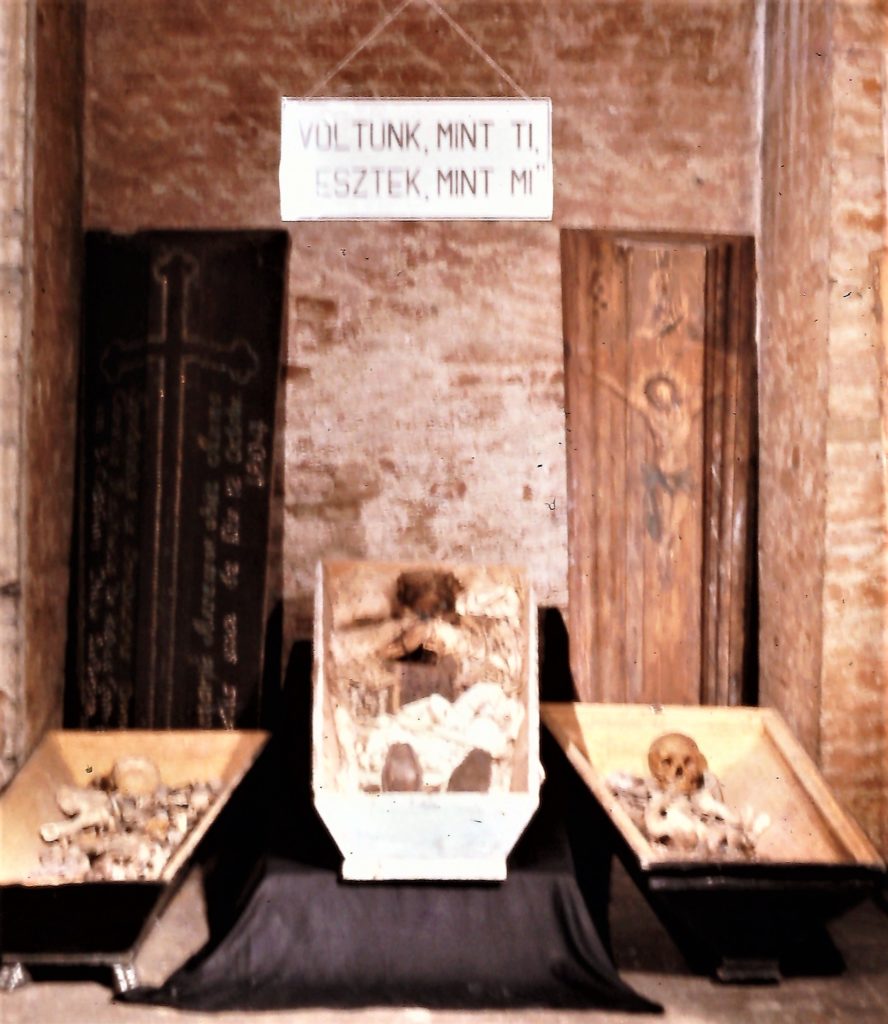
One of the many places we visited in 1972 was a town named Esztergom. It was Hungary’s capitol city before Budapest. It is due North of Budapest, and like Budapest, it overlooks the Danube River. There is a hill on top of which is a Basilica. I love to visit churches of all sizes and shapes and this one is one of my favorites. First off, it is huge. It has a large dome in the middle guarded by two smaller cupolas. Each of the three has a cross on top of it. It is said that at one time these large crosses were made out of pure gold.
There were very few visitors the day we were there, and we are pretty much the run of the place. It was during the summer and as I complained earlier, there was no air-conditioning anywhere. Once we entered this large church, it felt as though the air was artificially cooled and when we walked down some stairs into the catacombs, it was downright chilly. There were some tombs of some religious people as well as some kings and queens of long ago but there was a sight I will never forget: Behind some wrought iron fence there were three open coffins with three corpses in more and more advanced stages of decomposition. There was a sign in Hungarian: “Voltunk mint Ti, lesztek mint mi.”, meaning: “We were like you; you’ll be like us.” It really made me think!
The view from the side facing the river is spectacular. The Basilica is in plain sight of all ships passing. The Danube is the border between Hungary and the Czech Republic, which at that time was called Czechoslovakia and crossing the border was still forbidden. Slightly up-river stood a bridge (actually half a bridge) which stopped in the middle of the river. Looking down-river some of the machinegun towers left over from the Cold War era were still visible, albeit unmanned.
One of the more important events that took place during my visit was a re-acquaintance with my brother. He was still living at home with my parents. This was in part due to the severe housing shortage in Budapest, but the main reason was that without each other they could not financially afford to live separately. The fact that he and my mother were extremely close to each other was a contributing factor. In any event, this arrangement seemed to suit the three of them and Peter was always a very good boy. He was blacklisted from attending college due to my father, so he became a dental technician. He was very good and made both our parents’ dentures.
